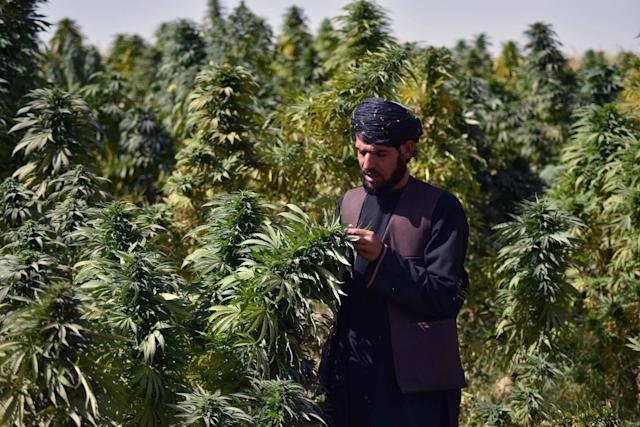Last Week In Weed Issue 47
Published November 29th 2021
In this week’s issue of Last Week in Weed. We will be looking at Malawi appointing former boxer Mike Tyson as the country’s ‘Cannabis ambassador.’ The global mainstream media spread an inaccurate story about the Taliban making a $450million deal with Australian company Cpharm and finally this week. Uber enters the cannabis industry as its subsidiary Uber Eats agrees to deal with Tokyo Smoke to facilitate cannabis sales in Ontario, Canada.
Mike Tyson becomes Malawi ‘Cannabis Ambassador’
The first story we’ll look at this week involves the Southeast African nation of Malawi and former world heavyweight champion boxer Mike Tyson. The news broke early last week that the Malawi Agriculture Minister Lobin Low had sent a letter to Mr. Tyson inviting him to become the country’s official ‘cannabis ambassador.’
In the letter, Minister Low invites ‘The bite fight’ boxer to become the official face of the country’s ‘medical cannabis’ industry to attract investment and promote tourism in the African nation. Last year Malawi ‘legalised’ the licensed cultivation and production of cannabis for medicinal purposes and certain cultivars of low-THC cannabis for industrial applications.
The offer was quickly accepted by ‘Iron Mike’ who has since 2016 profited from his investment in the US cannabis industry. Last week also saw the announcement of the launch of his own line of cannabis flower under the brand name Tyson 2.0.
The appointment of 55-year-old Tyson has sparked a backlash from opponents keen to bring up his previous criminal conviction for the 1991 rape of Miss Black America contestant Desiree Washington. The acting director of the Malawian think-tank the Centre for Public Accountability (CPA) Kondwani Munthali has voiced his concerns at the appointment of the former boxer.
Responded to this news in a statement sent to CNN he said that ‘Appointing a convicted rapist would be wrong’ going on to say that “Yes he paid his debt three years he was in jail, but we are saying to be the face of a nation is something beyond reformatory. We would want (a) less controversial character than Tyson.”
“The CPA is failing to comprehend why Malawi would want to have a convicted rapist as its brand ambassador, more especially, at this time, when efforts to curb violence against women are part of the government agenda” – Kondwani Munthali, CPA acting director
I am aware that some of you will argue that he shouldn’t have the role due to his previous convictions, however, while I do believe in the redemptive power of repairing, rebuilding, and rehabilitating the human psyche and spirit. I cannot help but disagree with his appointment to be Malawi’s international Cannabis ambassador on different grounds.
The justification given in the first instance is indicative of the potential naivety of the Agricultural Minister and the Malawian government. The region is famed for its legendary illusive landrace Malawi Gold. This ‘nearly-pure’ subspecies Cannabis Sativa is thought to be one of the rarest cannabis cultivars and produces a mild banana and coffee aroma.
We have already seen what international investment does to developing nations’ cannabis industries and I fear that international investment from the current industry will see the nation become another ‘cheap-hub’ to produce bulk cannabis for international export to more profitable markets.
Without immediate action, the world is in danger of allowing a few billionaire-funded investment vessels the legal right to rape, pillage, and effectively colonise the emerging cannabis industries of sovereign nations. In lieu of the rifle, the pen may be used to seal the fate of a nation and the sanction of corporate global domination through trade deals and ‘helping’ to establish internationally-focused industries.
MSM spreads inaccurate Taliban/Australian firm deal
Last week saw a rather interesting bit of ‘fake news’ make its way around the world. A story about the Taliban in Afghanistan agreeing on a deal with a small ‘Australia-based firm’ to create a ‘hashish processing plant’ in the newly recaptured middle-eastern nation.
On Wednesday stories started appearing on western media sites reporting on the news first broke by the Pajhwok Afghan News. In the story, journalists announced a deal to cultivate and process cannabis between the Taliban and an Australian firm named Cpharm worth an eye-watering $450million. Only there was a problem they named the wrong company as financing the deal.
The whole thing seems to have started after a tweet from an account connected with the repressive religious regime’s government. This led to Pajhwok Afghan News publishing its story about the deal. In which they quote the Afghan Interior Ministry spokesperson Qari Saeed Khosti as saying “the Taliban wanted to set up a legal framework to allow the country to benefit from the currently banned agricultural product. Despite the ban, it was alleged that Cpharm already has 10,000 acres of land in Afghanistan for growing cannabis.”
Quite the contradiction to the news that is being reported about the Taliban’s tough crackdown on drug consumers. In recent months there have been reports of forced imprisonment, violent raids, and even torture.
Evidently and unsurprisingly few of the mainstream media outlets that covered the story carried out any due diligence or adequate research into the authenticity or legitimacy of the post and alleged deal. They didn’t discuss the above news, they simply copied and pasted the details from other internally respected sources. Worse still several of them incorrectly named the company involved in the deal as a small Australian company of the same name.
The tiny family-run business Cpharm employs just 17 people and specialises in offering medical advice about pharmaceutical products in New South Wales, Australia. They have no international business dealings and are in no way currently involved in the cannabis industry in Australia let alone Afghanistan.
“We DO NOT manufacture or supply anything. We provide a medical advice service to the pharmaceutical industry within Australia. We have no products on the ARTG. We have no connection with cannabis or the Taliban. We have no idea where the Taliban media release has come from and want to assure everyone that it should not be connected to Cpharm Pty Ltd Australia” –Cpharm public statement
This false association triggered a deluge of calls to the company that is now considering whether to file against the media outlets that posted the story if the company suffers any reputational damage or lost revenue.
“We’re just trying to work out what we’re going to do to stop it,” he added. “We’ve had probably 40 or 50 calls today. It’s just out of control and it’s just all lies, media guys… not doing any due diligence on what they want to publish. Most of the companies we deal with would look at that article and laugh.” – Cpharm chief financial officer, Tony Gabites
The story has since been updated on Pajhwok Afghan News to claim that Cpharm is German, not Australian, however, there is no statement notifying the reader of the correction or update to the story. I doubt most of the outlets that covered the story will publish a correction and the narrative will continue that terrorism and cannabis are connected, at least in the eyes of the ruling class.
Uber enters the cannabis industry in Canada
The final story we’ll look at this week comes from Ontario, Canada where Uber has just announced that it will be moving into the countries cannabis industry. The news broke last Monday that its subsidiary food delivery service Uber Eats would become the first delivery App to facilitate the sale of cannabis in an exclusive partnership with cannabis retailer Tokyo Smoke.
Tokyo Smoke is a subsidiary of Canopy Growth Corp one of Canada’s and the world’s largest cannabis companies. They currently operate 69 stores across Alberta, Manitoba, and Ontario – where the new deal will be rolled out first.
Under the partnership, which has already begun, customers in Ontario can now use a dedicated section of the App to shop for cannabis and cannabis products stocked by Tokyo Smoke stores. The rideshare subsidiary then promises its customers that orders will be fulfilled and be ready to collect within an hour of purchase.
“Tokyo Smoke is thrilled to partner with Uber Canada on this innovative offering for our customers, bringing them high-quality products and the very best customer experience. As a market leader in innovation and a platform used by so many Canadians, we believe this is the ideal next offering that can be done safely and conveniently on the Uber Eats app” – Mark Hillard, VP Operations, Tokyo Smoke.
This partnership is being marketed as a way to help tackle the ever-pervasive legacy market and tackle the scourge of ‘drug-drivers.’ Even though the latest research suggests that as few as 14% of cannabis consumers get behind the wheel within the recommended two-hour‘ intoxication window.’
“We are partnering with industry leaders like Tokyo Smoke to offer safe, convenient options for people in Ontario to purchase legal cannabis. By combining a streamlined ordering process through the Uber Eats app with Tokyo Smoke’s in-person pickup service, we’re creating a new end-to-end experience for responsible cannabis ordering across the province.” – Lola Kassim, GM Uber Eats Canada.
In reality, this deal is about three things; first movers advantage, capitalising on an emerging market, and cold hard cash baby. After all, this move comes several months after the rideshare CEO Dara Khosrowshahi was quoted as saying;
“We think, obviously, food, grocery, pharmacy, and alcohol are part of that category,” but cannabis also holds potential. “When the road is clear for cannabis when federal laws come into play, we’re absolutely going to take a look at it. But right now with grocery, with food, with alcohol, et cetera, we see so much opportunity out there and we’re going to focus on the opportunity at hand”
Although Uber will benefit from first-mover advantage in the sector, it does beg the question why has no one attempted to integrate cannabis and home delivery services before? Well, three words ‘Proceeds of crime.’ The complex nature of national and international drug laws make processing digital transaction rather difficult as any CBD seller can tell you at length.
However, Uber has found a way around this, well, at least in Canada. An Uber spokesperson said that; “Uber’s in-house payments specialists, working with our trusted external banking and payments partners, implemented proprietary measures to ensure full payments compliance.”
I do wonder if these ‘proprietary measures’ will help them in the US where the international ride-share company also now owns the Boston-based billion-dollar alcohol delivery service Drizly. The company also owns a cannabis delivery service called Lantern., although Uber specifically stated that this wasn’t included in the deal.
Until the days of ‘legal’ cannabis arrive here in the UK most of us will have to make do with our cannabis being delivered by the Royal Mail or from a youth on a bicycle.
Updates from last week’s issue.
Here’s a quick update on two stories that we covered in the previous issue of Last Week in Weed. The new German coalition has now officially formed a government. This brings legitimacy to their pledge to ‘legalise’ the sale of cannabis in Europe’s most populous and wealthy nation.
The other story from last week involves the tragic death of a young woman. The man suspected of having a psychotic break and killing his then GF has been sentenced to 8 years and 8 months for the lesser charge of manslaughter. The court found that he met the criteria for diminished cognitive capacity and culpability in this case due to suffering a psychotic episode.
Written By Simpa For The Simpa Life




